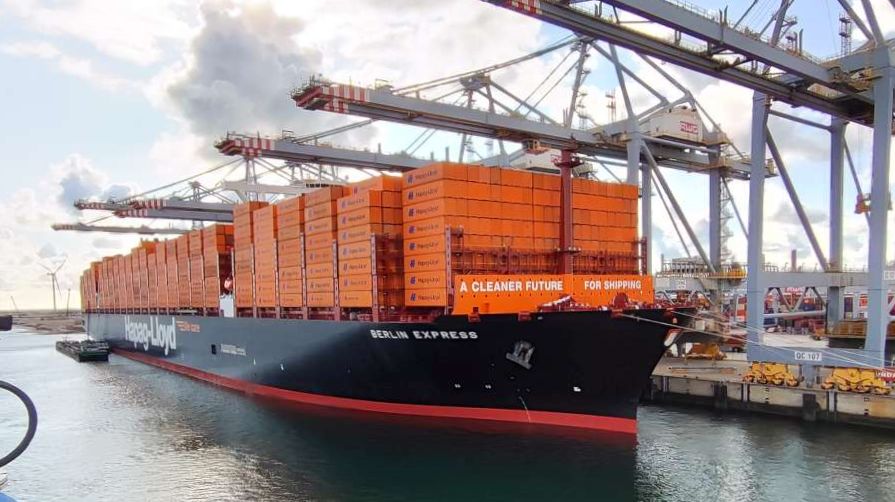Germany’s Hapag-Lloyd is working on a synthetic methane project as it looks to further reduce emissions from its fleet of LNG-powered containerships.
Hapag-Lloyd operates the converted 15,000-teu containership, Brussels Express, the world’s first ultra-large containership LNG retrofit.
Last year, the company also took delivery of the first of 12 ultra-large LNG-powered containerships from South Korea’s Hanwha Ocean, previously known as DSME.
Hapag-Lloyd first ordered six 23,500-teu LNG dual-fuel containerships from Hanwha Ocean in 2020, and it added six more sister vessels in 2021. The orders have a total price tag of about $2 billion.
The company said in its 2023 sustainability report released this week that it put three of its 12 new dual-fuel vessels into service.
A further nine dual-fuel newbuilds using LNG are scheduled to go into operation by 2025.
Hapag-Lloyd said its LNG bunker consumption totaled 22,769 tonnes in 2023. In 2022, the company’s LNG bunker consumption totaled 4,582 tonnes.
In September last year, LNG giant Shell started delivering LNG to Hapag-Lloyd’s giant LNG-powered containerships in the Dutch port of Rotterdam under a deal signed earlier in 2023.
Synthetic methane supply expected in 2026
Hapag-Lloyd says that these fuel-efficient 23,600 teu ships can run on LNG and future alternative fuels – thereby helping us the company on its journey to operating a net-zero fleet by 2045.
“Although we see fossil LNG primarily as a bridging fuel, propulsion technology using liquefied gas is viable for the future since LNG-powered vessels can also be operated with biological or synthetic methane as an alternative in the mid-term,” it said.
They then have the potential to be operated with “greatly reduced emissions”.
“We are currently keeping a close eye on relevant developments. In this context, Hapag-Lloyd is already working with potential producers of biological and synthetically produced methane,” the company said.
Hapag-Lloyd said that an initial project design for synthetic methane, produced from carbon dioxide (CO2) and green hydrogen, is currently in development.
The shipping firm said it expects to be able to bunker the first quantities from 2026.
“When exactly it will be possible to use synthetic methane on our dual-fuel vessels is still unclear at the current time,” the firm said.
An advantage of synthetic methane is that methane slip during manufacture is a “great deal less” than with the production of fossil LNG, it said.
Hapag-Lloyd said it can also be monitored more effectively.
Biomethane
For the current year 2024, Hapag-Lloyd has planned a pilot bunkering program with biomethane.
“To further promote the use of biomethane, we are part of a consortium for a Green & Digital Corridor between Rotterdam and Singapore,” it said.
The consortium aims to reduce CO2 emissions on this main trading route by 20 percent to 30 percent by 2030.
Hapag-Lloyd is part of the biomethane track and is working towards a pilot bunkering program in Singapore in 2024.
“We are also involved in the expansion of digitalization for the planning and handling of vessels and their cargo,” it said.

